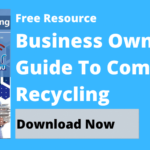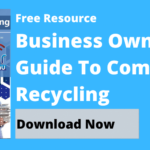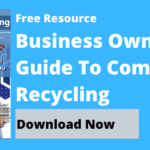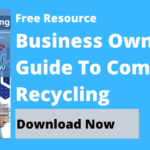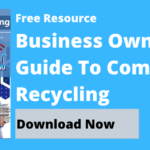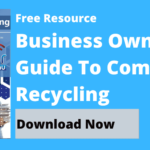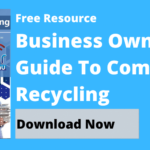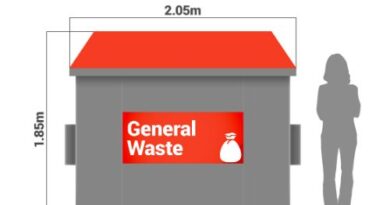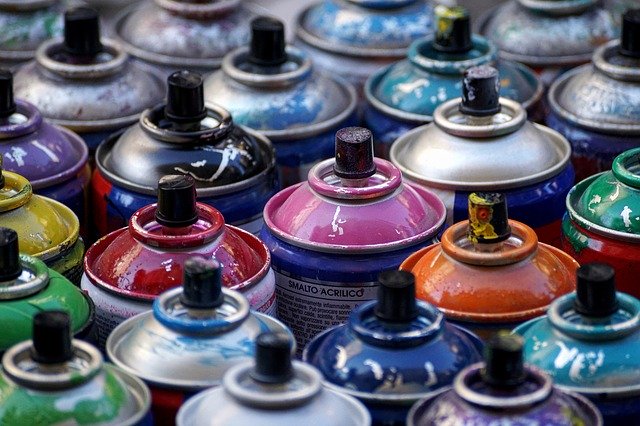How Can We Decrease Recycling Contamination? ♻️ Podcast Ep. 31 Don’t Be A Waster
Energy Disrupter
How Can We Decrease Recycling Contamination? ♻️ Podcast Ep. 31 Don’t Be A Waster
Listen on Apple Podcasts Listen on Spotify Listen on Google Podcasts Listen on Stitcher Listen on Amazon Music
Transcript: How To Decrease Recycling Contamination
Hello and welcome to another edition of our recycling podcast, Recycle: Don’t be a Waster! Today, we want to discuss the problem of contamination, which is, I suppose – it’s really the being of the life of recycling companies and recyclers, whereby, you know, you go to a site to pick up cardboard boxes or glass bottles or aluminium cans and what happens is the bin is actually full of just general rubbish plastic bags food waste and other stuff.
>Download Now: Free PDF Business Owners Guide To Commingled Recycling Bin Services
And you know, this makes the entire recycling process very difficult, and downstream leads to terrible issues with entire truckloads having to be dumped as general waste. And even on the macro scale, um… you know, Western countries traditionally were shipping their waste or suppose their supposed recycling to Asian countries, predominantly mostly China um… up to a couple of years ago.
The Chinese eventually said this is actually not recycling at all; this is just complete junk. So, that’s what happens when you… when things start um… Snowball effect happens and then it ends up with major issues. So I suppose what actually causes this um… this issue to begin with and like, I suppose, I’m a big believer that people do what they are incentivized to do.
Act 2: How To Decrease Recycling Contamination
People are rational beings, you know, not always, not individually. But on the larger macro scale, they are. And in large crowds, I do believe people do what they’re incentivized to do. Um… so look, I think there is an issue of wish cycling – that concept that people, you know, just believe that if they put it in this bin, it will be recycled, you know, that could be as simple as plastic bags in a commingle bin or um… polystyrene expander – polystyrene.
People think, oh, it’s, “why shouldn’t this be recycled?” It should be, but don’t think about the actual criteria as to what can go into that bin and what cannot. So, there is an aspect of some people who just want to do the right thing. There’s a second aspect that people want to, um… just don’t care, so people will chuck anything for convenience. So, there’s a certain segment of society that will just, you know, of people.
Of course, everyone’s on a spectrum and some people will just for convenience. If there’s no space in their general waste bin, they’ll just chuck that general general waste into the recycling bin so that’s just a simple option. And of course, in a business environment, um… recycle bins are cheaper for a domestic situation, you know, a private residence that… that… doesn’t really count because, you know, your bins are paid for by through your rates or through the, you know, your council taxes etc. so that aspect of it doesn’t really come into consideration.
Act 3: How To Decrease Recycling Contamination
But like, I suppose, people fundamentally are putting waste into recycling bins, you know, for one or three reasons: wish cycling, hoping it gets recycled, um… a lack of actual logical information, um… saying what can go in the bin and, you know, and I think this probably is, you know, there’s a… from an honest perspective, there when you’re putting stuff in the bin, you know, might be the evening time. You might be walking down in the dark looking to put something in the bin and it’s not exactly the time when you’re checking online or checking a piece of paper saying exactly what can be contained and what cannot be.
So that’s the second one. And then thirdly, I would say, it’s just people not caring and just throwing it in the bin because they can get away with it. And when I say they can get away with it, realistically, in a domestic collection system, well, the driver is not going to completely go through your bin and check everything that’s in it. Like, that clearly isn’t plausible.
Um… it has to be, you know, quite a quick process if it’s clearly contaminated. The driver may reject it but in a residential situation, you know, they won’t. And I think we’ve even seen this in some Sydney suburbs, you know, in the last month or two in 2022, whereby trucks were being filmed in certain council areas and the general waste truck was emptying the general waste and then just going out to the commingle bin.
Act 4: How To Decrease Recycling Contamination
Also, you know, there was a lot of uproar about this. This could obviously be because to some extent, residential collections do have a much higher level of contamination and this is often due to, I suppose, a lot of people not caring. But, if it is contaminated, it’s not rejected due to the council contracts, which are quite a tender, you know.
They’re very tight contracts and the waste or recycling company has to remove that waste in many regards. You know, there’s no real punishment; there’s no card and stick system to make people, you know, monitor what goes in those bins. And in many regards, it’s an honesty system. So, even if you dump complete junk in your commingled bin, it’s very likely that a residential pickup will be removed.
So, there’s a clear issue there, whereby people are not being incentivised to put that extra effort in to do the right thing. You know, these, this is a problem and, you know, what does it have what happens in the major scale. This obviously decreases overall recycling in the economy. It clearly makes the value it clearly makes recycling much tougher because it’s intermingled with garbage. And thirdly, it probably makes it much less cost-effective for the recyclers to do it, which will drive up the cost of recycling itself – make it more prohibitive, you know, and probably make fewer people enter the market.
Act 5: How To Decrease Recycling Contamination
So you know, those are the things. And then, I suppose, the question is: “How can we decrease contamination?” You know, what can we do? There have been examples, certainly, internationally and even, you know, talking about that in Australia, some of the examples have been, I’ve even seen it described as naming and shaming, whereby not just stopping at the truck would reject the bin and obviously, this would take a lot of real change in the terms and conditions that councils procure their waste and recycling services on it would take a real change in that regard to be much more, you know.
The truck will reject contaminated bins. Is that something that councils want to happen? Is that something that residential areas want to happen because clearly, there’ll be a lot of complaints? Clearly, that will slow down the process and, you know, I can imagine a lot of complaints will be heading up to council. And at the end of the day, the people who are on councils tend to be admittedly just the professionals who work there. But there are also elected officials who like to get elected, so you run into the realities of the electrical electro-electrical electoral cycle and party politics.
So, I know some countries have done naming and shaming where theoretically, the bin is rejected if it’s contaminated and a sticker or poster is placed on the bin saying “bin contaminated” and “cannot be emptied”. We’ve also had situations where people are suggesting c3 bins like almost plastic see-through bins so that the driver another and password buyer.
Act 6: How To Decrease Recycling Contamination
You can see what is exactly in the bin. You know clearly with that, there is, you know, the practicalities of… would that really show contamination is debatable? And there’s a privacy issue. Do people want to be seeing, you know, what’s in your bin? You know, it raises questions, you know, what people… if they were drinking, say, alcoholic drinks and felt a bit, oh maybe, their neighbors will be judging them, that they’re drinking too much would that create issues?
And that in theory, could that even decrease recycling? You know, would people even think, oh I’m not going to put all these balls this weekend? I had a big night. I might put some of those bottles in the general waistband just to protect my, uh… you know, protect my ego or my reputation. So there are issues with that, and certainly, privacy, you know, should… you should other people be able to see stuff. It is a question, but I suppose fundamentally, the options for reducing this comet contamination they can be divided into, maybe, let’s say, three methods.
And the first one is education. More education, more clear labeling, more clarity will clearly, you know, decrease that information gap and help people know exactly what goes in the bin. Different methods can be done. To do that, advertising, potentially simplification of stuff. But again, it’s never going to reduce it completely. The second one is a policing system whereby the drivers will reject bins that are, you know, have got clear contamination in them.
Act 6: How To Decrease Recycling Contamination
The drivers will say no to certain items, and again, there are repercussions to that. Clearly, unhappy people; clearly the council will get involved and it would have to be a significant change in the terms and conditions of those procurement contracts that are raising those services.
And uh thirdly, I think you probably are looking at some format of you know clarity, clearer bins, something along those lines. There might be some format of fining, you know. And again, this is… I don’t think anybody wants to get into this system purely because of the logistics; the administration costs, you know.
Act 7: How To Decrease Recycling Contamination
Once you put in place these things, it becomes very difficult to do them. But you know, when you… there is the reality in life that when people want to change things, you know, we’ve got a thorough covert. We’ve seen a lot of certainly nudging that was certainly a bit stronger than nudging at many times. But when you have these sort of um… I suppose, even the seat belt wearing – it was brought in. It’s legal. You have to wear a seat belt in a car in Australia. If you don’t, eh… you know, I think you’re fine. And I think you always get criminal charges.
I’m not exactly sure of the repercussions but it’s not small so to some extent there may have to be down the line some form of, I don’t know, some penalty. And I’m by no means promoting penalizing people at their own homes for making honest mistakes. That’s certainly not what we’re talking about. But there has to be some method of, you know, of reducing that issue. And I think that has to be part of a bigger discussion. So okay, so where you came to listen to a podcast about recycling and you hear me calling for restrictions which is the last thing we want to be doing. So I think we’ll leave it there today. Once again, thanks and Recycle: Don’t be a Waster!



